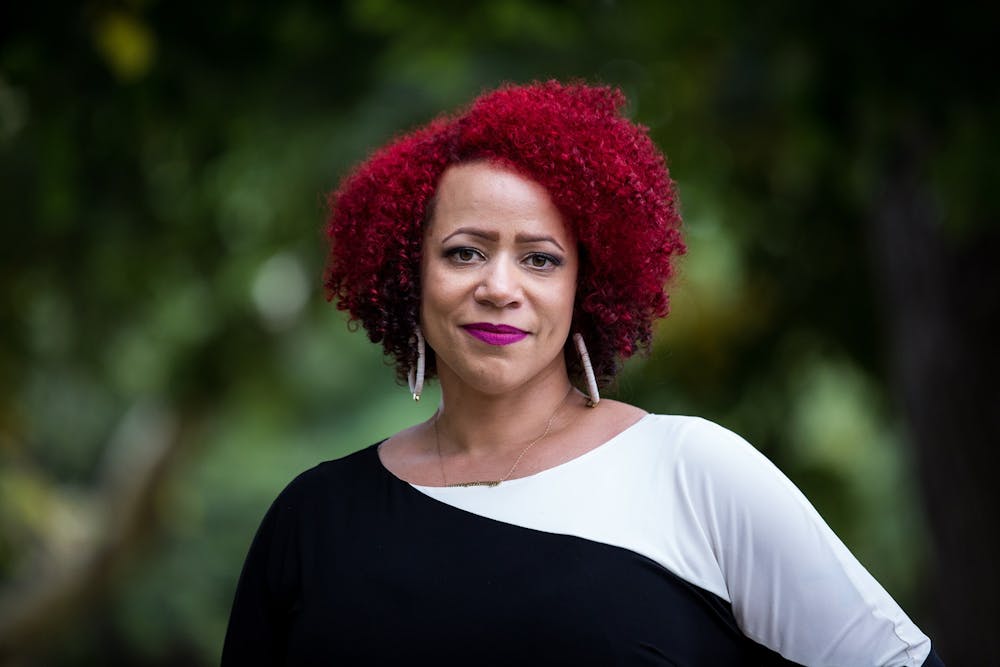The initiatives are:
- Training 20 faculty and staff members as search and selection process advisers through the Office of Diversity, Equity and Inclusion
- Posting a position for a trauma-informed therapist in the Multicultural Health Program by July 31
- Reserving money each fiscal year for events sponsored by the Carolina Black Caucus
Office of Diversity, Equity and Inclusion
In order to increase the inclusivity of UNC’s hiring process, the 20 trained faculty and staff members will “play an active role” in the hiring process of new staff members, developing positions and integrating new employees into the University, according to the settlement.
Throughout the search process for finding and hiring new employees, there will be a focus on selecting diverse candidates with diverse identities, Leah Cox, the vice provost for equity and inclusion and chief diversity officer, said.
“Obviously, there must have been a feeling in the room that the search for Nikole Hannah-Jones was not inclusive — it was not without bias and all those things,” she said. “And so I think that that was probably something that maybe she insisted upon, is training across the institution how to do inclusive searches.”
Along with diversifying the hiring process, trained faculty and staff should also be aware of how to recognize issues surrounding diversity in all departments, in all conversations.
“We want to expand this across the institution so that the Nikole (Hannah-Jones') of the world will be able to say, ‘Well, it was an inclusive process’,” Cox said.
Multicultural Health Program
The Multicultural Health Program is a sector of UNC’s Counseling and Psychological Services that serves the mental health needs of the University’s students of color. The MCHP works to break the mental health stigma in the community through offering both individual and group therapy, as well as community outreach Erinn Scott, assistant director for the MCHP, said.
A job posting for a trauma-informed therapist within the MCHP was posted before the settlement was released, but Scott hopes that it will increase the number of applicants who are passionate about being a part of the University’s change.
“We're starting to also see a body of literature and research that's really supporting this idea of race-based trauma," Scott said. “Over time, if people are continually confronted with overwhelming, scary, both overt and covert racism, microaggressions, systemic barriers — it can really wear on both their physical, mental and sort of spiritual health.”
To get the day's news and headlines in your inbox each morning, sign up for our email newsletters.
The MCHP is looking to hire an individual who is not only knowledgeable on race-based trauma, but is also knowledgeable of UNC’s history with race and what the University’s community of color has faced, Scott said.
“I think it's important to have a race-related, trauma-focused therapist who, even if they're not really familiar, but is interested in learning about how both current race-related traumas, but also historical pieces may impact our students of colors’ experience here at Carolina's campus,” she said.
There is not yet a specific date for when the therapist will be hired, but Scott is hoping to add the addition to the MCHP team during the fall semester.
Carolina Black Caucus
The Carolina Black Caucus will receive $5,000 each fiscal year through June 30, 2025 through the Provost’s Office. This money can be used for meetings, conferences and other events upon approval of Cox.
After Hannah-Jones’ tenure was denied in 2021, she engaged in a listening session over the summer with the Caucus, and asked the organization for a list of things that they would like to see change at the University.
The Caucus wasn’t sure what the list would be used for, chairperson Jaci Field said, but the Caucus later understood when they saw that the settlement included some of the items they discussed.
“It's nice to be heard, and not only to be heard, but to put that listening into action,” she said. “And that means more than a performative plan sometimes, and I just love the way it continues to challenge our leadership to really put Carolina Next into action.”
The goal of the Caucus is to engage, educate and create a community for Black UNC staff and faculty members, and the money from the settlement will be used to focus on all three of those things, Field said. A date has not yet been set as to when the first payment will be made.
Field commends the chancellor’s office, the Board of Governors and the BOT for continuing efforts to reach a settlement, and coming to an agreement after many months.
“I think that there's great advocates on both of those bodies, and they could have let it go and not continue to try to do the right thing,” she said. “But I think whenever anybody has a misstep, the only way to make those changes is to really take an honest look and be willing to change.”
@livvreilly
university@dailytarheel.com | elevate@dailytarheel.com



